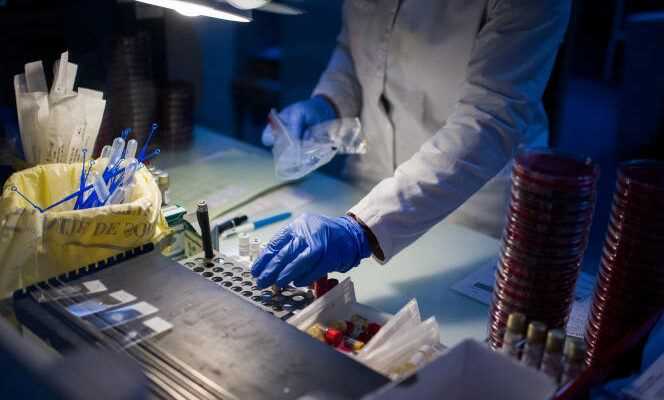Over the course of the health crisis, they have become almost commonplace. A familiar element of the landscape, to which passers-by only give a brief glance. After the rush this summer, on PCR tests, driven by the rebound of the epidemic and the implementation of the health pass, the queues in front of the medical biology laboratories of patients ready to have their nostrils crushed are less provided and rarer since the start of the school year.
“The frenzy of the last two months has calmed down a bit, even if the pace is still strong”, comments Alain Le Meur, president of the Association for the Progress of Medical Biology (APBM). The week of September 6, 4.18 million tests for SARS-CoV-2 – including 1.26 million PCR tests – were performed in France. A decrease of 27% compared to the peak in mid-August. Over the year as a whole, however, the trend is upward: test volumes have practically doubled when compared to the weekly average observed between January and May.
The Covid-19 has made the fortune of medical biology laboratories. In 2020, the consumption of analyzes and samples jumped by 37.4% in France, reaching a turnover of 6.2 billion euros. Exceptional growth, boosted almost exclusively by the Covid-19 screening activity.
And the year 2021 promises to be even more prosperous, despite the discounts applied to the price of tests. Of the 142 million tests performed since the start of the epidemic, nearly 110 million have been performed during this year.
Private labs first ruled out by health authorities
“The story had started very badly”, recalls Mr. Le Meur. While the virus is blazing at full speed in France in March 2020, the health authorities are excluding private laboratories from their strategy, reserving screening by PCR test only for public hospitals. A decision that makes the profession cringe.
“ We have been using this technique for a long time, particularly in the detection of sexually transmitted diseases, or the search for viruses such as hepatitis B and C, or HIV ”, continues Mr. Le Meur.
These laboratories were finally mobilized in the fight a few weeks later, called in urgently for reinforcement by the government. Then began an incredible race for medical weapons to ” catch up “. Masks, gowns, PCR testing machines, reagents … “We ordered everything we could. Everything that was available, we took. We equipped ourselves like aircraft carriers ”, says Michel Sala, medical director of the Cerballiance laboratory network. The group, which has some 450 laboratories in the territory, has spent 20 million euros to arm itself against the virus. “All this without really knowing if it would not be at a loss. It was a daring bet. “
You have 59.24% of this article to read. The rest is for subscribers only.
